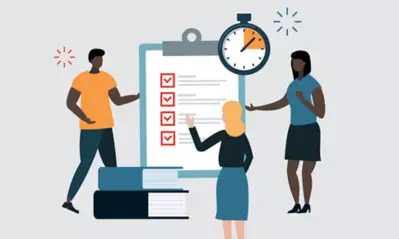University of Phoenix Survey Finds More Than Half of Employed US Adults Feel Companies Do Not View Mental Health as an Acceptable Reason to Take Time off Work
By University of Phoenix
Being too busy at work and shame or judgement by coworkers are other top reasons for not taking time off for mental health
PHOENIX, Jan. 24, 2019 – January is Mental Wellness Month, and University of Phoenix today announced survey findings regarding employed adults and perceptions of burnout and mental wellness in the workplace. The online survey, conducted among 2,020 U.S. adults, found more than half (55 percent) of those currently employed say they have experienced job burnout. However, even with the high rate of burnout, employees are not taking time off. Only 34 percent of employees say they have taken days off for mental health compared to 61 percent who say they taken time off for physical ailments.
“While many people experience short-term symptoms of burnout due to specific circumstances, it is important to address these feelings instead of hoping they go away,” said Dean Aslinia, Ph.D., LPC-S, NCC, chair for the counseling/mental health counseling program at University of Phoenix. “The data suggests that many employees are not taking their mental wellness as seriously as their physical health. Ignoring our mental health and symptoms of burnout not only affects job performance and relationships, it can also have a lasting impact on one’s physical health.”
Feelings of burnout can be brought on by number of things including heavy workload, workplace stress and lack of recognition and may have a direct correlation with overall job satisfaction. The survey found that only two in five (44 percent) employed U.S. adults are satisfied with their job, and nearly nine in 10 (86 percent) feel worker burnout is connected to job satisfaction.
Signs of Job Burnout
A majority of Americans view anxiety (67 percent), fatigue (66 percent), depression (58 percent) and anger (55 percent) as signs of job burnout. Among those who say they have experienced burnout, similar percentages have experienced these four symptoms:
- Fatigue – 68 percent
- Anxiety – 65 percent
- Anger – 53 percent
- Depression – 48 percent
Why Have Only a Third of Adults Taken Time Off for Mental Health Reasons?
While there has been an increased effort to change the perception of mental wellness, negative stereotypes and barriers still exist that keep people from taking time off for mental health.
When asked why people do not take more mental health time off, U.S. adults indicated the following reasons:
- The company does not view this as an acceptable reason – 46 percent
- People are too busy at work to take time off – 39 percent
- Shame or judgment by coworkers – 36 percent
- Fear of someone else taking over their responsibilities – 35 percent
- Societal stigma around mental health – 33 percent
- People take them, they just don’t talk about it – 26 percent
“These results speak to the lack of support on a societal level for recognizing, supporting and treating mental health. Our culture is slowing becoming more open to discussions about mental health, but more work must be done,” said Dr. Aslinia. “In the workplace, companies have the ability to change this narrative and talk about the importance of mental wellness. As organizations continue to evolve and offer additional benefits, such as paternity leave and virtual work options, mental health should also be a key consideration, including in additional time off and support systems. Investing in employees and giving them time to recharge is essential for long-term company success.”
Despite the stigmas that still exist, the data shows that some employees are taking care of their mental health. Interestingly, 12 percent of employed U.S. adults note they have taken five or more days off in the past 12 months for mental health reasons. The survey also found parents of children 18 and under are more likely than non-parents to have taken at least one day for mental health reasons (42 percent vs. 28 percent) in the past 12 months.
“It begins with us. If you feel you are experiencing burnout, take steps to address it, including having discussions with your manager, taking time off or speaking with a mental health professional,” said Dr. Aslinia. “There are many resources available to help you build good mental health habits. University of Phoenix, for example, operates six counseling centers in five states (Ariz., Calif., Nev. and Utah) that offer free services to anyone in the community.”
To view a visual representation of the data, click here. For more information on the counseling center, or to set up an appointment, visit phoenix.edu/students/counseling-skills-centers.
Survey Methodology
This survey was conducted online within the United States by University of Phoenix using The Harris Poll from Nov. 8-12, 2018 among 2,020 U.S. adults ages 18 and older, among whom 1,123 are employed. Figures for gender, age, race/ethnicity, household income, investable assets, education, household size, employment status, marital status, and region were weighted where necessary to bring them into line with their actual proportions in the population. For more information, please contact Amanda Barchilon.
About University of Phoenix®
University of Phoenix is innovating to help working adults move efficiently from education to careers in a rapidly changing world. Flexible schedules, relevant and engaging courses, and interactive learning can help students more effectively pursue career and personal aspirations while balancing their busy lives. University of Phoenix serves a diverse student population, offering associate, bachelor’s, master’s and doctoral degree programs from campuses and learning centers across the U.S. as well as online throughout the world. For more information, visit phoenix.edu.


